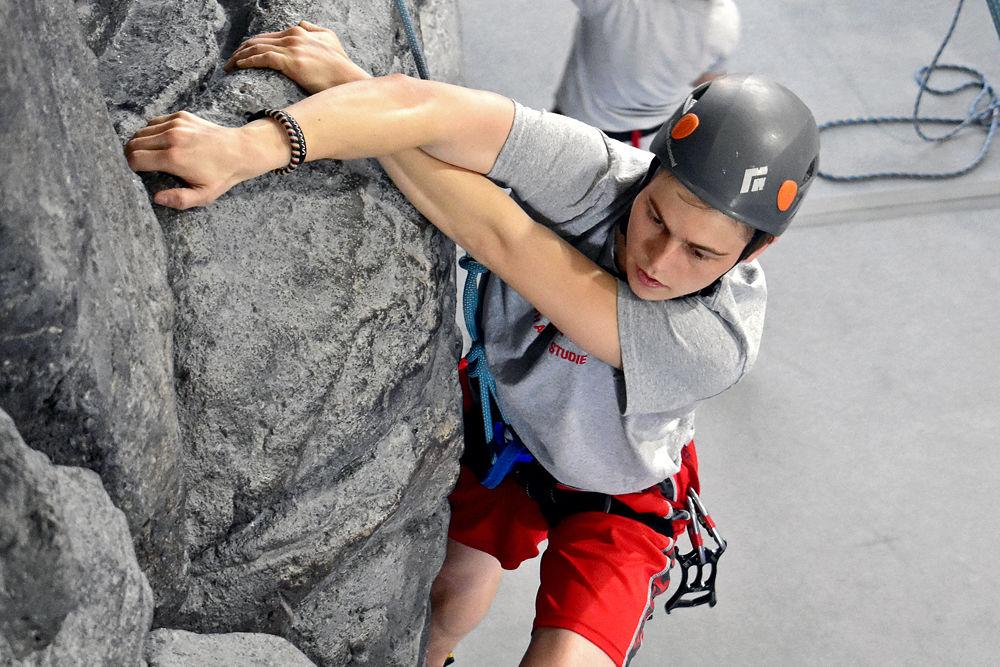NC State’s outdoor adventure courses are one hidden gem of NC State’s Health and Exercise Studies program*. One subset of the program, rock climbing, offers students a chance to try a new sport that challenges both the body and the mind.
Scott Schneider, a lecturer in basic and intermediate rock climbing courses, has been climbing since his undergraduate career.
“The sport of climbing has evolved tremendously,” Schneider said. “I feel like even 15, 20 years ago, it was kind of a fringe sport. Now it’s mainstream in that there’s climbing gyms at almost every university and in most decent-sized metropolitan areas, and it’ll be in the Olympics now in 2020.”
Rock climbing is a sport that combines physical endurance with strategy. Learning the necessary skills is crucial to becoming a proficient and safe climber. Schneider described the basics of climbing.
“There are many sub-disciplines to climbing, but in a gym setting, most people top rope, where there’s a pre-established anchor,” Schneider said. “Then you do an established route, where you try and figure out a sequence of moves to get to the top.”
NC State has its own climbing wall, located in Carmichael Gym, called Faux Rock, which mimics a natural rock outcrop. There are two main courses taught on the wall. The first one, Schneider said, is geared toward beginners.
“We have basic rock climbing, which is an introductory course that is very comprehensive and teaches proper belay techniques, climbing movements,” Schneider said. “We show different belay devices and go through the equipment you need in detail, as well as get a lot of time in climbing and rappelling.”
The second course focuses on more specific techniques, according to Schneider.
“Then we have an intermediate course, and that class is designed for people who have been climbing for a bit, if you want to transition from climbing in a gym to outside,” Schneider said. “It’s more of a technical skill-based class. We focus on anchor building, how to risk management, how to use all the gear you need to transition to climb outside.”
Terry Dash, rock climbing instructor and outdoor leadership program coordinator, elaborated on the differences between the courses.
“In basic rock climbing you learn basic safety skills, [and] in intermediate rock climbing you learn more advanced safety skills,” Dash said. “If you’re just going to climb indoors, you only need a few basic things to get started. If you’re going to climb outdoors, you need to be able to safeguard yourself when you’re in a natural environment.”
For interested students, there are a multitude of different ways to get involved in rock climbing through NC State.
“There’s a rock climbing class on the wall, and there’s anywhere from two to three sections of climbing a day,” Dash said “We offer intermediate two or three different times a semester, so there’s an opportunity for students who have taken that first class or have previous climbing experience to join that class.”
In addition to climbing courses offered through health and wellness studies, students can also take a one-time course at Faux Rock.
“They can also take a climbing clinic through Wellness and Recreation Outdoor Adventures… which is usually held in the evening,” Dash said. “They can learn enough to pass the belay skills test, and they can come recreationally climb.”
The instructors gave a few reasons why students should try rock climbing. Schneider shared some thoughts on the rock climbing in general and the program at NC State.
“It’s a great sport and activity,” Schneider said. “It’s got the social aspect; it’s really just a good community of people. It’s fun and challenging. It’s definitely an activity you can do throughout your life. It’s a great chance to learn it while you’re here at NC State, because we have a great facility. It’s super affordable because all the gear and instruction is included for free, so it’s hard to beat the opportunity and access you get as a student.”
Dash mentioned a few more perks of learning to rock climb.
“It’s probably one of the most fun recreational activity classes you can take,” Dash said. “The nice thing about rock climbing is it’s something you can do one or two times a year with your friends and have fun, or it can become the main focus of your recreational endeavors or it can become a career. So you can take it as far as you want to.”
Finally, Dash gave one last piece of advice to all the students of NC State looking for adventure.
“We have a program called Take 8 at State, which says you should try and take a HES class every semester and experience things that you wouldn’t normally do, learn something new,” Dash said. “You should try and learn new things as often as you can.”
More information about rock climbing at NC State can be found on the climbing wall website.
*Editor’s Note: The article has been updated to reflect the correct name of the department.













